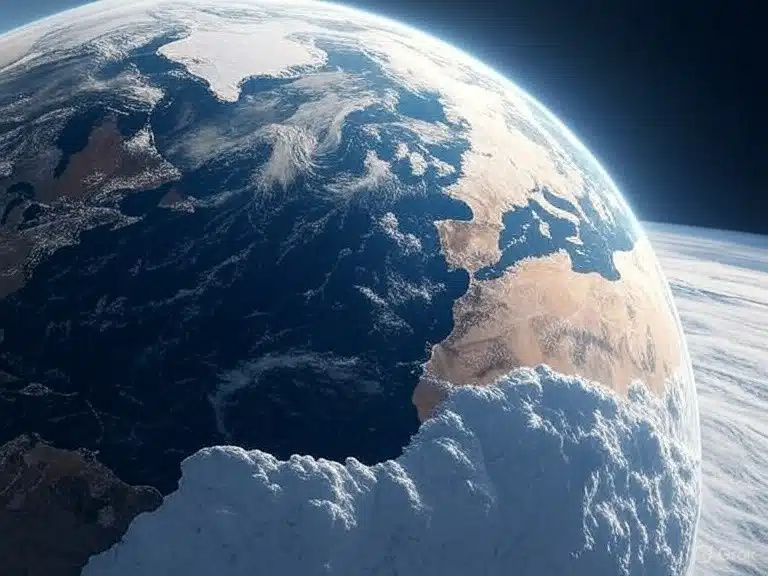The Sun is the beating heart of our solar system. Every living organism on Earth depends on its warmth and light. But what if one morning, humanity woke up to a shocking discovery—the Sun had suddenly dimmed to half its brightness overnight? This cosmic twist would throw Earth into chaos, reshaping climate, ecosystems, and human society. In this article, we’ll explore the potential scientific consequences, survival challenges, and long-term adaptations humanity might face in such a chilling scenario.
The Immediate Impact on Earth’s Temperature
If the Sun’s brightness dropped by 50% overnight, Earth’s energy intake would collapse dramatically. Currently, the Sun provides about 1,361 watts per square meter of energy to Earth’s atmosphere. Cutting that in half would send shockwaves across the planet:
- Within a week, global average temperatures would start to plummet by several degrees.
- Within a year, Earth could cool by more than 15–20°C, plunging much of the planet into sub-zero conditions.
- Equatorial regions would experience temperatures similar to today’s Arctic winters.
This sudden dimming would effectively launch Earth into a new ice age almost immediately.
Collapse of Photosynthesis and Agriculture
Plants rely directly on sunlight for photosynthesis, the process that fuels life on Earth. With only half the sunlight:
- Crop yields would crash by 40–60% in the first harvest cycle.
- Staple foods like rice, wheat, and corn would struggle to grow.
- Large-scale famine would become inevitable without rapid adaptation.
The food chain would collapse, starting from plants to herbivores and then to carnivores. Humanity would be forced to rely on artificial farming methods, like indoor vertical farming with artificial light, to survive.

Atmospheric and Weather Changes
The Sun drives Earth’s weather systems by heating the atmosphere and oceans. With reduced solar energy:
- The water cycle would slow dramatically, reducing rainfall.
- Deserts would expand as evaporation decreases.
- Storm systems like hurricanes would weaken due to the lack of warm ocean energy.
- The jet stream would destabilize, causing erratic weather and prolonged winters.
Snowfall would increase in regions where moisture remains, blanketing much of the planet in white, reflecting even more sunlight and accelerating cooling—a phenomenon called the albedo effect.
Human Survival Strategies
Human ingenuity might help us endure, at least for a while. Potential adaptations include:
- Artificial Sunlight – Giant orbital mirrors or solar-powered lamps could redirect and amplify sunlight to key agricultural zones.
- Underground Cities – Populations may retreat into subterranean or insulated cities to conserve heat.
- Geoengineering – Massive projects could attempt to trap heat in Earth’s atmosphere, such as releasing greenhouse gases or building heat domes over cities.
- Energy Dependence – Nuclear, geothermal, and fusion (if developed) would become essential for survival.
But the scale of the crisis would make survival a race against time.

Long-Term Effects on Ecosystems
If the Sun remained dim for centuries:
- Forests would vanish, replaced by tundra and ice.
- Oceans would freeze from the top down, trapping marine life.
- Many species would face extinction, except extremophiles adapted to cold, dark conditions.
- Humanity might create artificial biospheres to keep ecosystems alive in controlled environments.
This shift would turn Earth into a frozen, alien-like world—similar to moons like Europa or Enceladus.
Could Humanity Survive?
The real question is not whether Earth could survive, but whether humanity could adapt quickly enough. Technological civilizations thrive on stability, and such a drastic cosmic event would dismantle global systems overnight. Survival would depend on cooperation, innovation, and resource management on a scale never seen before.
Some scientists speculate that in such a world, humans may even consider colonizing nearby planets—or building giant space habitats—as a way to escape Earth’s deep freeze.
Conclusion
If the Sun suddenly dimmed to half its brightness overnight, Earth would descend into an immediate and severe ice age. Agriculture would collapse, ecosystems would crumble, and humanity would be pushed to the brink of extinction. Yet, through technology and adaptability, our species might find a way to endure—though it would mean fundamentally changing how we live, farm, and use energy.
This scenario reminds us of how fragile life on Earth is, and how deeply we depend on the delicate balance of sunlight that makes our planet habitable.

